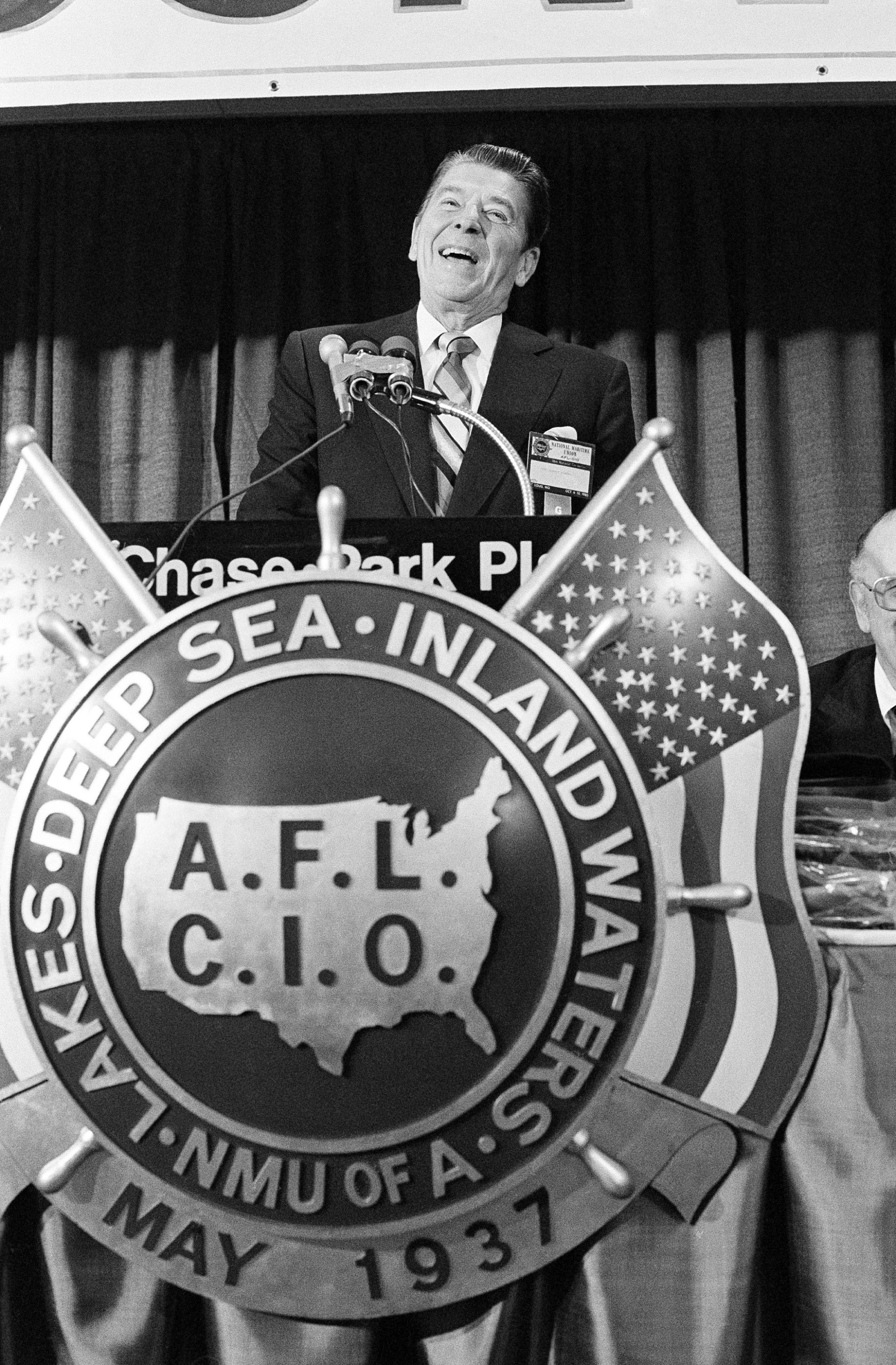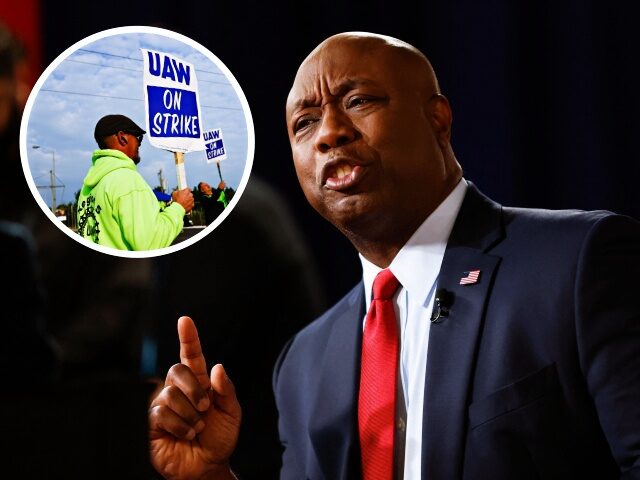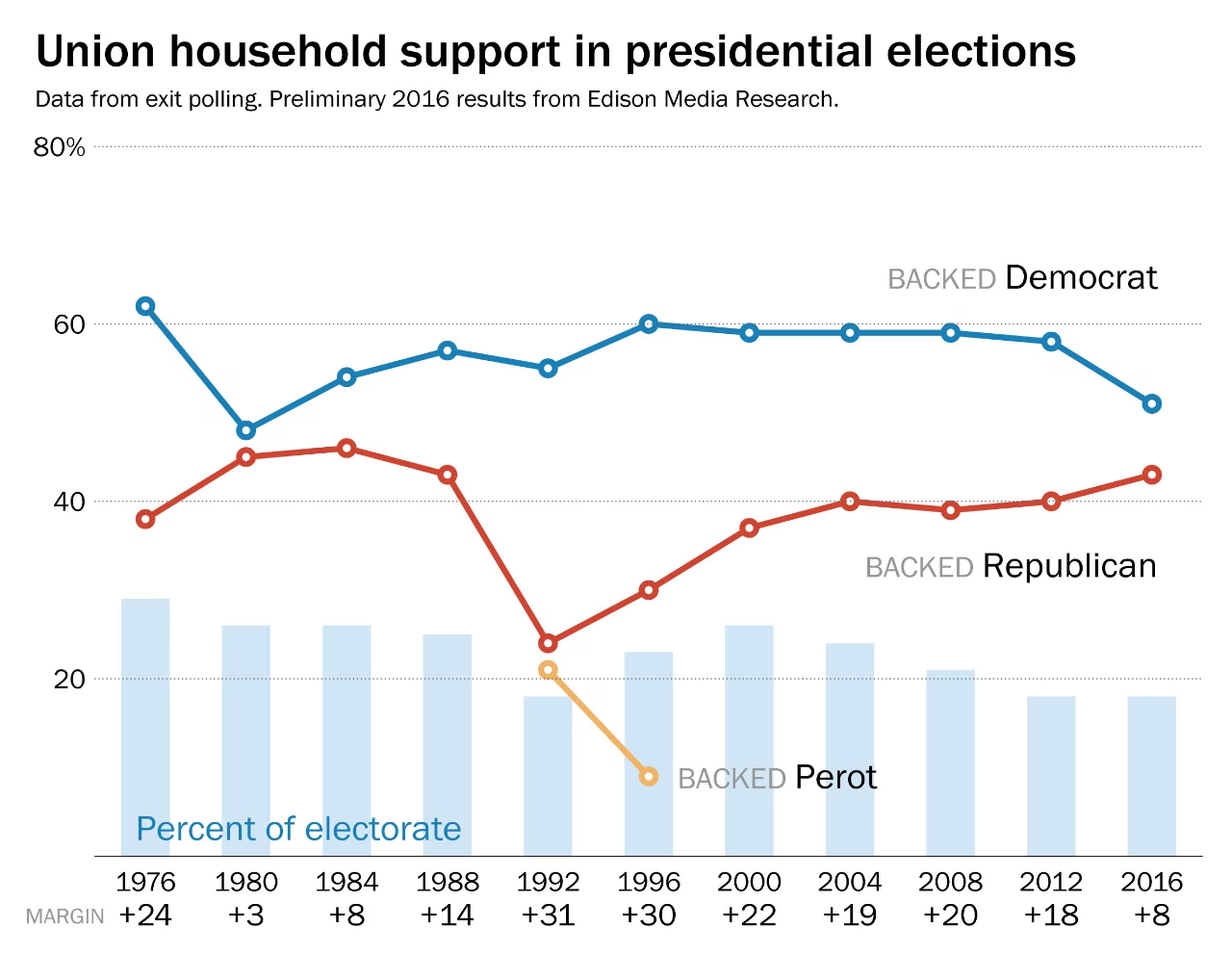Sen. Tim Scott (R-SC) suggested firing American auto workers who are currently striking against General Motors (GM), Ford, and Stellantis for better pay amid record inflation and commitments that their jobs will not be eliminated as a result of President Joe Biden’s green energy agenda.
During a campaign event in Fort Dodge, Iowa, Scott invoked former President Ronald Reagan to suggest firing members of the United Auto Workers (UAW) who are currently on strike against the Big Three as contract negotiations have yet to net an outcome.
When asked if he would insert himself into a labor dispute, Scott said, “I think Ronald Reagan gave us a great example when federal employees decided they were going to strike. You strike, you’re fired. A simple concept to me.”
“To the extent that we can use that once again, absolutely,” he said.
Scott went on to claim that auto workers “want more money working fewer hours” and “want more benefits working fewer days.”
“In America, that doesn’t make sense … I would stop that as president,” Scott said.
Though Scott attempted to portray Reagan as a hardline, anti-union president, the former Hollywood actor continues to be the only president who was a former union leader after having served as president of the Screen Actors Guild (SAG).
Likewise, when running for president, Reagan famously courted working-class union households — primarily auto workers in Macomb County, Michigan — to create his populist faction known as “Reagan Democrats.”
During the 1980 and 1984 presidential elections, Reagan helped plummet support for Democrats among union households by scoring more than 40 percent with the demographic.
Likewise, Reagan enjoyed endorsements from many labor unions while running for president. In 1984, the powerful Teamsters union endorsed Reagan for reelection. He was also endorsed by the National Maritime Union.
Chapters of various local labor unions, including those affiliated with the American Federation of Labor and Congress of Industrial Organizations (AFL-CIO), endorsed Reagan in 1984.
At the time, Reagan was dealing with attacks from UAW bosses. Reagan, though, still sought auto workers’ support, urging fairness and restraint in the negotiations.

Republican presidential candidate Ronald Reagan promised to rebuild America’s merchant marine fleet during a speech before the National Maritime Union in St. Louis, Missouri, on October 9, 1980. After his speech, the Republican nominee won a standing ovation and the endorsement of the 35,000-member union. (AP Photo/Charles W. Harrity)
Unlike auto workers striking, Reagan’s issue with air traffic controllers who walked off their jobs in 1981 was that of national security and law enforcement, the University of Virginia’s Miller Center notes:
“They are in violation of the law, and if they do not report for work within 48 hours, they have forfeited their jobs and will be terminated,” President Ronald Reagan said at a press conference on August 3, 1981, responding to a nationwide air traffic controllers’ strike. Members of the Professional Air Traffic Controllers Organization (PATCO), one of the few unions that endorsed Reagan during the election of 1980, were picketing for better pay and working conditions when about 13,000 of them walked off the job. [Emphasis added]
Two days later, when most PATCO workers did not return, it became clear that Reagan was not bluffing. On August 5, he fired 11,345 of them, writing in his diary that day, “How do they explain approving of law breaking—to say nothing of violation of an oath taken by each a.c. [air controller] that he or she would not strike.” [Emphasis added]
Reagan took no joy in doing it, however. The law was the law, and he believed public safety workers had no right to strike. It was the same approach Reagan’s hero Calvin Coolidge took when the Boston police went on strike in 1919. [Emphasis added]
Scott’s claims that auto workers are simply looking to get paid more while working less have been debunked by Breitbart News Economics Editor John Carney, who writes that the wage hikes they are looking to secure are on par with inflation and the cost of living.
Carney writes:
Once that’s added to a true-up for the excess cost-of-living increase over the past four years and the loss of the expected real wage increases, you can easily get to a reasonable economic justification for something in the neighborhood of a 30 percent wage increase. [Emphasis added]
There’s not likely to be much of an inflationary effect from even a 25 to 30 percent wage increase, either directly or indirectly. Directly, the increase will affect only around 150,000 workers, which amounts to one-tenth of one percent of private payrolls. That’s not even a rounding error for average hourly earnings. Indirectly, there may be upward pressure on wages as other employers step up pay to compete for workers; but absent accommodation by the Fed in the form of rate cuts, the higher labor costs are likely to be absorbed by manufacturers’ margins rather than get passed on to consumers. [Emphasis added]
Like Scott, former United Nations Ambassador Nikki Haley (R), also the former governor of South Carolina, similarly claimed that increasing wages for auto workers will cause prices to increase.
“The union is asking for a 40 percent raise, the companies have come back with a 20% raise – I think any of the taxpayers would love to have a 20 percent raise and think that’s great. But the problem is we’re all going to suffer from this,” Haley told Fox News. “This is going to cause things to go up, and this is going to last awhile.
Haley also bragged about busting up labor unions while governor.
“I was a union buster,” Haley said, continuing:
I didn’t want to bring in companies that were unionized simply because I didn’t want to have that change the environment in our state. We very much watched out for workers … we didn’t encourage middlemen between companies and their workers. We encouraged workers to have that direct communication with them.
As a so-called “right-to-work” state, Scott and Haley’s South Carolina is home to non-union auto workers. However, research has shown that even non-union workers benefit from union collective bargaining by encouraging all employers to raise worker wages to prevent unionization.
“The single largest factor suppressing wage growth for middle-wage workers over the last few decades has been the erosion of collective bargaining, which can explain one-third of the rise of wage inequality among men and one-fifth among women,” researchers at the Economic Policy Institute (EPI) write:
One of the greatest impacts of the decline of collective bargaining has been that nonunion workers in industries or occupations that previously had extensive collective bargaining no longer receive the higher pay that their employers used to provide (given concerns that their best workers might leave for a union job or for fear their workers would choose collective bargaining). Thus, the erosion of collective bargaining has affected both union and nonunion workers alike. [Emphasis added]
While auto workers ask for pay increases, company executives have raked in massive pay increases.
“The Big Three CEOs saw their pay increase by 40 percent over the last four years, while our pay only went up by 6 percent,” UAW President Shawn Fain said this month.
GM CEO Mary Barra, in 2022, took in almost $29 million, which is 362 times the median paycheck of the average GM employee. Such large pay disparities between executives and employees were not always the case.
A study from EPI last year found that company executives are earning about 399 times their average employees’ paycheck, whereas, in 1965, they earned about 20 times their average employees’ paycheck.
John Binder is a reporter for Breitbart News. Email him at jbinder@breitbart.com. Follow him on Twitter here.


COMMENTS
Please let us know if you're having issues with commenting.